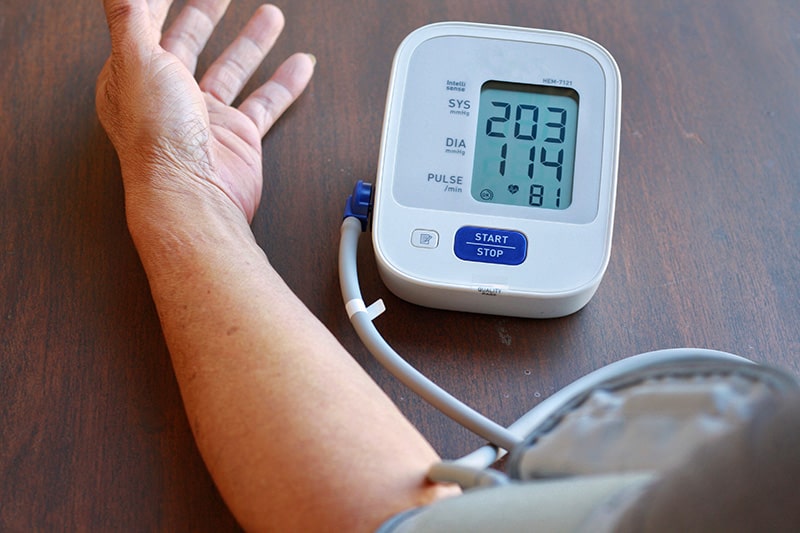What is blood pressure?
Blood pressure refers to the force that blood exerts against the walls of the arteries as it circulates throughout the body. It is an essential part of cardiovascular health, and proper blood pressure control is crucial for overall well-being.
Blood pressure is measured in millimeters of mercury (mm Hg) and is expressed in two numbers. The first number is called systolic pressure and represents the pressure in the arteries when the heart beats and pushes blood out. The second number is called diastolic pressure and represents the pressure in the arteries when the heart is resting between beats.
A healthy pressure reading is usually around 120/80 mm Hg, with the systolic number ranging from 90 to 119 mm Hg and the diastolic number ranging from 60 to 79 mm Hg. However, the pressure can vary depending on age, overall health, activity level, and other factors.
When is blood pressure too high?

Blood pressure is considered too high, or hypertension, when the systolic pressure consistently measures 130 mm Hg or higher and the diastolic pressure consistently measures 80 mm Hg or higher. High blood pressure is a common condition and is a major risk factor for heart disease, stroke, and other serious health complications.
It is important to note that pressure can fluctuate throughout the day and can be affected by factors such as stress, activity level, and diet. Therefore, a single high reading does not necessarily indicate hypertension. To diagnose hypertension, pressure should be measured multiple times over a period of several weeks.
If, after doing all of that, the blood pressure still continues to be high, then it’s time to consult with a medical professional. And, apart from that, you also have to make various lifestyle changes, and dietary changes.
Below, you can find the list of 8 best tips that would help you in taking care of your blood pressure.
8 Best Tips to Take Care of High Blood Pressure
There are many steps you can take to keep your blood pressure in check. In this article, we will discuss how to take care of your pressure and maintain a healthy cardiovascular system.
Exercise regularly
Regular exercise is one of the best things you can do for your cardiovascular health. Exercise helps to keep your heart and blood vessels healthy and reduces your risk of high pressure. Aim for at least 30 minutes of moderate-intensity exercise, such as brisk walking or cycling, on most days of the week.
Eat a healthy diet
A healthy diet is essential for maintaining healthy pressure. Eat plenty of fruits and vegetables, whole grains, lean protein, and healthy fats. Limit your intake of salt, saturated and trans fats, and processed foods. Eating a balanced and healthy diet can also help you maintain a healthy weight, which is important for blood pressure control.
Maintain a healthy weight
Being overweight or obese can increase your risk of high pressure. If you are overweight, losing as little as 5-10% of your body weight can significantly reduce your pressure. Aim for a healthy BMI (body mass index) between 18.5 and 24.9.
Limit alcohol intake
Drinking too much alcohol can raise your blood pressure. If you choose to drink, do so in moderation. This means no more than one drink per day for women and two drinks per day for men.
Quit smoking
Smoking can raise your pressure and increase your risk of heart disease and stroke. If you smoke, quitting is the best thing you can do for your cardiovascular health. Your doctor can recommend smoking cessation programs and resources to help you quit.
Manage stress
Chronic stress can contribute to high pressure. Find healthy ways to manage stress, such as meditation, yoga, or deep breathing exercises. Regular exercise, social support, and a healthy work-life balance can also help reduce stress levels.
Monitor your blood pressure
Regular pressure monitoring is essential for maintaining healthy pressure. Your doctor can recommend how often you should have your pressure checked based on your age, overall health, and risk factors. You can also monitor your pressure at home using a home pressure monitor.
Take medication as prescribed
If you have high pressure, your doctor may recommend medication to help control it. It is important to take your medication as prescribed, even if you feel fine. If you experience side effects or have trouble sticking to your medication regimen, talk to your doctor.
Also Read: Which Dry Fruit Is Best for Weight Loss?
Conclusion
In conclusion, maintaining healthy blood pressure is essential for overall cardiovascular health. Regular exercise, a healthy diet, maintaining a healthy weight, limiting alcohol intake, quitting smoking, managing stress, monitoring your pressure, and taking medication as prescribed can all help keep your pressure in check. If you have concerns about your pressure, talk to your doctor. They can help you develop a plan to keep your blood pressure at a healthy level and reduce your risk of cardiovascular disease.


Leave a Reply